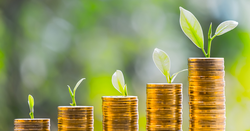
Open Banking: Still The Next Big Thing
As open banking expands, consumers and companies stand to enjoy lower fees, greater ability to leverage their financial data: if they can control the risk of stolen or misused data.

Sector-wise, finance and technology outpaced all others in a record-setting year overall.

Bond markets generally slid, but green issuances continued to roll.
Justin Brass, managing director at litigation finance specialist Burford Capital, recently visited Global Finance to discuss funding innovation and the bottom-line value of litigation.
The worst may be past for Russia’s economy, but it will be tough to attract global investors, even if Putin caps his foreign policy triumphs by persuading the West to ease sanctions.
The wealthy in Asia are ramping up their exposure to infrastructure investments, in a move that illustrates how disappointing returns from traditional asset classes are pushing yield-desperate investors into some of the most illiquid strategies.
The banking industry’s leading lights have largely adjusted their business plans to a world of tighter regulations, higher capital requirements and less leverage. Now, they are taking on new competitors by embracing the very information technology that has disrupted their business.
Uncertainty over the future has grown, while growth forecasts have been cut.

Peter Hayes, global head of invest-ment research for Prudential Real Estate Investors, joined Global Finance editors in New York to talk about which property markets look hot in 2016—and which look too hot.
Cuba: News that Anglo-Dutch consumer products company Unilever will return to Cuba to build a $35 million plant in the special development zone at the port of Mariel, about 40 kilometers west of Havana, is one of the clearest signs yet that the communist nation is taking a more pragmatic approach to foreign direct investment.
Capital Markets | Equity Offering
A potential partial privatization of Saudi Arabia’s state oil company, Saudi Aramco, would require the company to remove its veil of secrecy.
Peter Hayes, global head of invest-ment research for Prudential Real Estate Investors, joined Global Finance editors in New York to talk about which property markets look hot in 2016—and which look too hot.
Saudi Arabia is the Gulf Cooperation Council’s largest economy, but major economic, political and social challenges threaten the kingdom’s immediate economic future. Reducing its dependence on oil and gas is now a case of when, not if.

Mining and gas reserves made Mozambique a darling among foreign investors—until last year. Now the government needs to diversify.
Unlike some of its Eastern European neighbors, the Czech Republic has shunned joining the eurozone and has surprised many with its stable and healthy levels of economic growth. However, progress is still needed on business transparency.
The prospect of the lifting of economic sanctions against Iran has investors excited about the return of this market to the global economic community. But the message is: Proceed with caution.
Puerto Rico
He has become the face of Puerto Rico’s woes, warning in media interview after interview of its inability to pay its bills and serving as the island’s bearer of bad financial news.
Societe Generale and the Ecobank-Nedbank alliance, are two major players preparing for growth in African transaction banking in the next decade.
At SIBOS in Singapore, Global Finance honored those banks who are investing in digitizing service offerings to weigh in against new, non-traditional competitors.
Inside SIBOS | Day 2
High on corporate treasurers’ agenda – getting ready for the next global financial crisis
Arabia is meeting with some success in its efforts to entice foreign investors to six new economic cities in the kingdom.